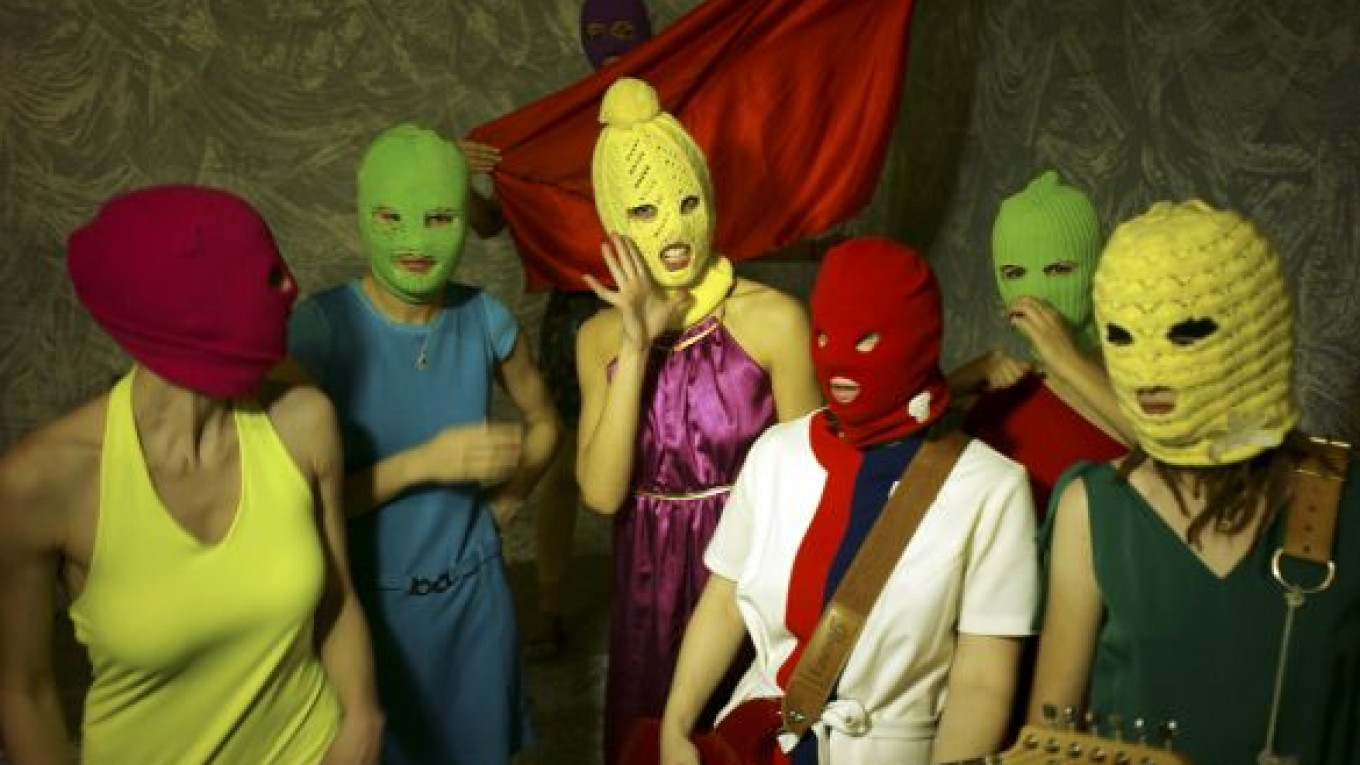Pussy Riot won unexpected support from two pro-Kremlin officials on the second day of its trial Tuesday, and a plaintiff reluctantly accepted its apology for performing a blasphemous, anti-Putin song in Christ the Savior Cathedral.
The three defendants — Nadezhda Tolokonnikova, 22; Maria Alyokhina, 24; and Yekaterina Samutsevich, 29 — have been under arrest since early March and face up to seven years in prison on felony charges of “hooliganism motivated by religious hatred” for staging the impromptu performance in the church in February.
The women’s arrest has provoked a public outcry in Russia and abroad. Amnesty International has called the arrested band members “prisoners of conscience.”
In an open letter on his blog late Monday, Valery Fedotov, head of United Russia’s branch in the Vasileostrovsky District of St. Petersburg, called on the Moscow court to “free Pussy Riot as soon as possible.”
Fedotov condemned the defendants for “offending” believers but said he was “convinced that all thinkable and unthinkable terms of your incarceration have passed.”
“I also see perfectly that the accusation, which is based on quotes from canons of the sixth and the seventh centuries, makes our country a laughingstock before the whole world, while your trial is increasingly turning into an international symbol of lawlessness reigning in Russia,” Fedotov said.
He added that he was sure that most United Russia officials shared his opinion but that “many don’t dare to speak their minds until the party leadership sanctions it.”
Dmitry Ternovsky, head of the politics section at the pro-Kremlin youth summer camp at Lake Seliger in the Tver region, told President Vladimir Putin, who visited the camp Tuesday, that the Pussy Riot case was “too politicized.”
“If these girls hadn’t pronounced your name in the church, then it seems to me they would not have been detained for so long and maybe would not face such a long prison term as they do now,” Ternovsky said, according to Interfax.
Putin’s reaction was not reported.
International support for the trio also grew, with British writer Stephen Fry on his more than 4.6 million Twitter followers “to do everything to help Pussy Riot” and “pressure Putin” in connection with the trial.
Latvian Foreign Minister Edgars Rinkevics tweeted that the trial marked “a return to the worst traditions of the U.S.S.R.”
Anti-corruption blogger Alexei Navalny, who himself was charged in a politically tinged case Tuesday, told journalists that Pussy Riot “shouldn’t be in prison because they committed petty hooliganism.” He called the trial a throwback to the Middle Ages.
Also Tuesday, renowned Soviet writer Valentin Rasputin joined 26 minor writers and poets in an open letter seeking a prison term for Pussy Riot. The letter called the defendants “extremists.”
Meanwhile, nine plaintiffs and several witnesses testified against the band members at Moscow’s Khamovnichesky District Court.
Altar boy Vasily Tsyganyuk, a plaintiff who earlier testified that he still felt “pain” from witnessing the performance, said he accepted the band’s apology as read out by their lawyer, Violetta Volkova, on Monday. But he also said apologies must “come from the heart,” “not from a text on paper,” Interfax reported.
Other plaintiffs refused to accept the apology, but all agreed that they believed the court would issue a fair verdict.
The band’s lawyers said otherwise. One lawyer, Mark Feigin, on Twitter that the judge had rejected 70 percent of the questions that the defense team had intended to ask the plaintiffs Tuesday.
Another lawyer, Nikolai Polozov, that the judge had barred all questions about a “political element” to February’s performance.
The defendants asked the judge, Marina Syrova, to interrupt the trial Tuesday because they didn’t have enough food and sleep, Interfax reported. Monday’s hearing lasted from 11:45 a.m. until about 10 p.m., with a one-hour break, Polozov told The Moscow Times in a text message.
On Tuesday, the women received no nourishment except a cup of tea each from 5 a.m. to at least 3:30 p.m., Ekho Moskvy reporter Tikhon Dzyadko .
The judge at first rejected the request to halt proceedings, citing a medical check that said the defendants were fit to attend the trial. When Volkova threatened to ask for a replacement judge, Syrova promised to declare a break for lunch and a nap.
The Russian Orthodox Church remained silent Tuesday about Pussy Riot’s apology. Moscow Patriarchate spokesman Vsevolod Chaplin has said the church would not forgive the band members unless they “repented.” Repeated calls to Chaplin’s cell phone went unanswered Tuesday. Another patriarchate spokesman, Vladimir Legoida, was out of town on a business trip from Tuesday to Thursday, his secretary said.
A Message from The Moscow Times:
Dear readers,
We are facing unprecedented challenges. Russia's Prosecutor General's Office has designated The Moscow Times as an "undesirable" organization, criminalizing our work and putting our staff at risk of prosecution. This follows our earlier unjust labeling as a "foreign agent."
These actions are direct attempts to silence independent journalism in Russia. The authorities claim our work "discredits the decisions of the Russian leadership." We see things differently: we strive to provide accurate, unbiased reporting on Russia.
We, the journalists of The Moscow Times, refuse to be silenced. But to continue our work, we need your help.
Your support, no matter how small, makes a world of difference. If you can, please support us monthly starting from just $2. It's quick to set up, and every contribution makes a significant impact.
By supporting The Moscow Times, you're defending open, independent journalism in the face of repression. Thank you for standing with us.
Remind me later.






